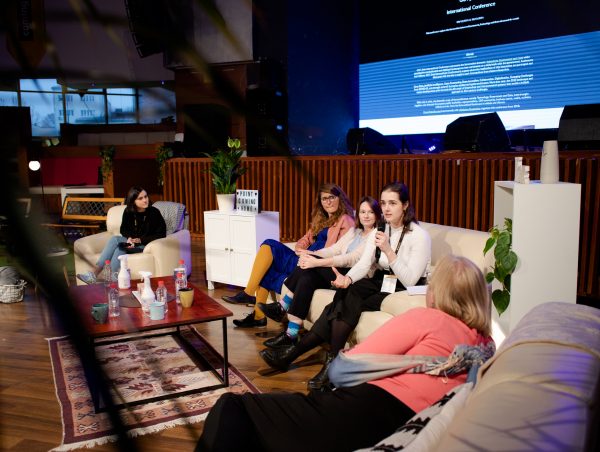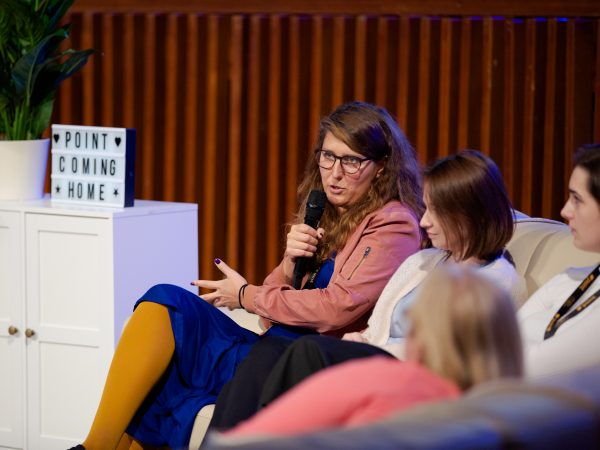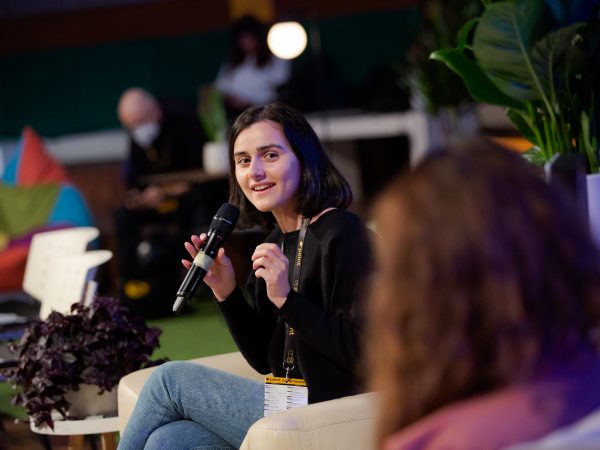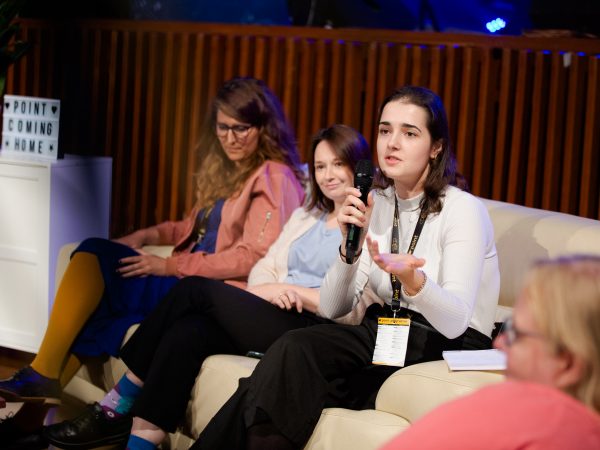The Future of Events – Are They Changed Forever? The importance of networking
The Future of Events – Are They Changed Forever? session sparked the discussion about the changes that Covid-19 pandemic brought on live events and the things we learned from having numerous offline events throughout it.

The session was moderated by Darko Brkan, a leading civil society activist and the executive director of CA “Zašto ne” (“Why not”). Session’s speakers were Nino Macharashvili, the co-founder and director at ForSet, a data communications organisation in Tbilisi, Maja Durlik, a Community Manager in TechSoup Europe, Iryna Shvets, the director at OPORA Lviv, Ariana Gjuli, the Project Coordinator at Open Data Kosovo and Baybars Örsek, the director of the International Fact-Checking Network.
The first thing the session speakers addressed was their experience with organizing events during the pandemic. Baybars Örsek, from the International Fact-Checking Network, who joined the Point conference online, said that the pandemic made a big impact on Global fact, the event that brings the fact-checking community together. As he pointed out, the first online conference they organized was hell from the facilitator’s point of view, but the second one was much easier.
“Virtual conferences gave the understanding that we do not need to travel so much to just do a session, but conferences are more about experience sharing and bringing the community together,” said Örsek.
The main thing panelists agreed on was that having so many online events in the past year showed that the conferences are actually much more about networking than anything else.

FOTO: Vanja Čerimagić
Maja Durlik from TechSoup Europe pointed out that at this time we have online events competing with offline events – and losing. However, online events did have certain benefits as well: everybody got better at using technologies. From the organizers’ point of view, Durlik said that events during the pandemic were a learning experience, but people got better at it over time.
“We got better at understanding what we need from the event, you choose necessary things and cut out the things that are not as important,” said Durlik.
Offline events, unlike the online ones, also emphasized the importance of human connection since it is the element that brings trust.
Nino Macharashvili, the co-founder and director at ForSet, said that the first time they organized an online event was so exciting, it was a fun challenge. However, they noticed a big change in the next one they did: people were tired, and the event had a completely different dynamic.
“Now it’s a challenge for everyone to provide a safe environment for offline participants and an engaging experience for the online ones”, said Macharashvili.

FOTO: Vanja Čerimagić
As she pointed out, she still believes that online events have a certain value for certain people. However, they need to be made attractive and engaging for people present.
Iryna Shvets from OPORA Lviv said that the online format makes networking hard, but it can still work when it’s only about transferring knowledge from speakers to participants online. Offline is about building trust between people and reporting, and it’s extremely difficult to do it online, said Shvets.
Ariana Gjuli, the Project Coordinator at Open Data Kosovo, stated that the pandemic prepared organizers perfectly for unexpected events. Their experience was that online, people were more available to attend, which was a good thing. Pandemic made it possible not to spend as much time on traveling and logistics, and it saved money for organizers.
The speakers on the session agreed that a very important realization they have from the pandemic times is that it’s not just about the format, online or offline, it’s about goals you are trying to achieve with your event. The community-building aspect is now really important.
“Connecting with others online is possible, but it got difficult when we got an overload of online events. Online, offline and hybrid is just a format, it is more about the goals you are trying to achieve”, said Nino Macharashvili, from ForSet.
Online events also brought a lot of glitches and mistakes, some funny and some stressful, concluded the session’s speakers.

FOTO: Vanja Čerimagić
Macharashvili shared that they tried to tackle technical problems by starting to implement “what can go wrong and how to address those situations” sessions before events, which helped a lot with the preparation.
“The thing that I hope will stay with us after the pandemic is having a better understanding of the goals and the mission of the event you are organizing”, said Maja Durlik from TechSoup Europe.
When it comes to the future of events, Baybars Örsek from the International Fact-Checking Network said:
“Bringing people together should be the central aspect of conferences in the future. It should be more about networking and encouraging and empowering people to work together.”